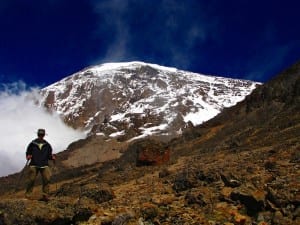It was the experience of a lifetime for one “Hilltopper.”
West Liberty psychology professor and Wheeling resident, Dr. Michael Marshall scaled Africa’s highest peak, Mt. Kilimanjaro, over his holiday break this past December. He, his wife, Mary Kay, and adult son, Jared, climbed the mountain along with a team of three other Americans
“It’s been a dream of mine ever since high school when I read ‘The Snows of Kilimanjaro,’ by Ernest Hemingway. I wanted to make it a family trip and invited everyone in our family to go. Only my wife and son were game,” he explained
Interestingly, it took 21 African porters, guides, cooks and support staff to escort the group to their destination. The climb took a total of eight days. Marshall described the effort as both grueling and intense.
“Slogging through 46 miles of wet, cold, oxygen-deprived mountain trail was very hard, demanding work—the hardest thing I have ever done in my life, although the greatest experience I have ever had in my life too! Everyone fell multiple times. The trail was slippery. We slipped on mud, algae, gravel, shale and ice.
“My wife fell, dislocated and fractured her thumb, within the first hour of climbing. She chose to soldier on and complete the climb even though she was in pain the whole time. She went into surgery when we returned and had her fractured thumb reset with pins and a bone graft. Her hand will have to heal for eight weeks before the pins can be removed. However, the transformative experience of climbing, eating, helping, laughing, and summiting together as a family made all the suffering pale in comparison,” he said.
Marshall felt it was now or never for him.

“I’ve wanted to do it practically my whole life. At the age of 64 I came to the realization that if I put it off any longer, it would likely never happen, so I seized the moment,” he said. Training was not as extreme as you might expect.
“It took five months to train with daily running, weight training and doing wind sprints up the trail to the top of the hill behind our house (located in Woodsdale). The appeal of Mt. Kilimanjaro is that it is the highest mountain in the world that can be climbed without technical climbing skills — but you must be fit and healthy.
“Its location on the equator keeps the peak relatively balmy at around 10 degrees Fahrenheit. At 19,341 feet, it is the fourth highest of the seven summits, the highest mountain on the continent of Africa and the tallest freestanding mountain in the world. It is rated as an extreme altitude climb. Anyone who attempts to climb it without proper preparation or acclimatization will lose consciousness and can die of HAPE or HACE (High Altitude Pulmonary Edema or High Altitude Cerebral Edema).”
Marshall, a native of Los Angeles, has taught at WLU since 1992. He spent about a year researching and preparing for the trip.
“I booked the airfare and the mountain climbing company we hired. It’s not as easy as it sounds. The first climbing company I contacted sent me an email message in broken English instructing me to wire $8,000 cash directly into their account in Africa and they would be sure to greet me at the airport when we arrived. I passed on that one! The only airline that fit our schedule was Turkish Airlines. All flights passed through Istanbul. We didn’t arrive in Tanzania until two days after our plane flew out of Washington, DC. I also researched and planned our high altitude medicine, acclimatization and nutrition regimen. My wife bought all our clothes and equipment.
Acclimatization is a science in itself. There were 12 components of our acclimatization plan. For instance, the first step was to rent a hypoxic tent that we slept in for the month before departure. We also had to buy trip insurance with an emergency medical mountain evacuation rider in case of a catastrophic health problem. Lastly, the three of us had to get $1,000 worth of tropical medicine immunizations before we left.”
He said the hardest thing to get used to was living out of a tent for eight cold, wet days. Still he recommends the effort to anyone who wants an adventurous vacation.
“It’s not a leisure vacation. It’s a personal challenge. Test yourself with Mt. Kilamanjaro and if you succeed you’ll get a huge sense of pride and reward,” he said.
Marshall and his family must thrive on adventure since they rewarded themselves not with spa-like rest but with another adventure!
“We rewarded ourselves for our successful summit with a three-day safari on the Serengeti plain.”
If that’s not enough he “plans to climb to Everest Base Camp (Nepal), hike the Machu Picchu Inca Trail (Peru), and walk the Camino de Santiago pilgrimage from St. Jean Pied de Port, France, through the Pyrenees mountains to the Atlantic coast at Santiago de Compostela, Spain in the near future. Hopefully, he’ll continue to pack his WLU logowear to promote the Hilltop around the world.
EDITOR’S NOTE: Also assisting on this article was Tara Adamczyk, WLU student and staff writer for the Trumpet.